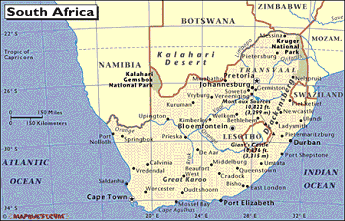 Population: 43,586,097
Population: 43,586,097

Ethnic Groups: Black 75.2%, White 13.6%, Colored 8.6%, Indian 2.6%
Language: 11 official languages, including Afrikaans, English, Ndebele, Pedi, Sotho, Swazi, Tsonga, Tswana, Venda, Xhosa, Zulu
Predominant Religion: Christian 68% (includes most whites and Coloreds, about 60% blacks and about 40% of Indians), Muslim 2%, Hindu 1.5% (60% of Indians), indigenous beliefs and animist 28.5%
Government: Republic
Capital: Pretoria is the administrative center, Cape Town is the legislative center and Bloemfontein is the judicial center
BRIEF HISTORY/BACKGROUND
Politics – The Union of South Africa was formed in 1910. A white minority parliamentary republic was created in 1961. The infamous ‘apartheid’ system politically and economically marginalized non-whites and brought untold pain and suffering to the majority. A worsening economic climate, increasing political isolation, a deteriorating security situation and the ending of the Cold War all triggered rapid changes in the 1980’s. The last laws under girding apartheid were repealed in 1991 and the country’s first free national democratic elections took place in 1994. Nelson Mandela’s government worked hard to set up a free, non-racial government and constitution, and initiate the long healing process with commendable successes. Much disillusionment has set in due to the slow rate of change, limited economic growth and increasing crime and corruption.
Economy – The richest and most industrialized country in Africa The world’s biggest exporter of non-petroleum minerals – especially gold, platinum, chrome, diamonds and coal. Well diversified, industrial economy. Lack of oil, water and an erratic rainfall hinder growth. The post-apartheid government promised to stimulate development, initiate affirmative action to further African economy progress and open up the economy. The economy has not grown sufficiently to improve employment, housing, education and give hope for the future to the impoverished majority.
Religion – There is freedom of religion. A strong push to give all religions equal say has given high profile to the ethnic African religions, Islam, Hinduism, humanism and the interfaith movement at the expense of Christianity. (Operation World, 21st Century Edition, WEC International)
GFF’S MINISTRY IN SOUTH AFRICA
GFF’s goal is to go to the unreached/poorly reached area to evangelize, disciple and train, believing that these ministries will result in Christians who can reproduce themselves, thus fulfilling the task Christ left us to do.
G.F.F. HAS FOUR PURPOSES FOR THE WORK IN SOUTH AFRICA
1. Evangelism
2. Discipleship
3. Establishing of churches
4. Education
Our G.F.F. missionaries will be working in partnership with South Africans to establish fundamental churches. There are many Christians there but leadership and teaching are needed.
GFF’S COMMITMENT
GFF will consider any creative means in order to initiate church planting movements among any unreached people group (UPG). We offer career, short term and summer opportunities to be directly involved in reaching UPGs. We are open to going to any UPG if there are no fundamental ministries trying to reach them and there is a team of people who feel God leading them to go with GFF to get the job done.
CURRENT NEEDS
1. Church Planters
2. Youth workers
GFF is looking for men and women who are called of God to serve on the mission field. GFF has competent, experienced leadership and desires to assist new missionaries in becoming successful missionaries for God’s glory.